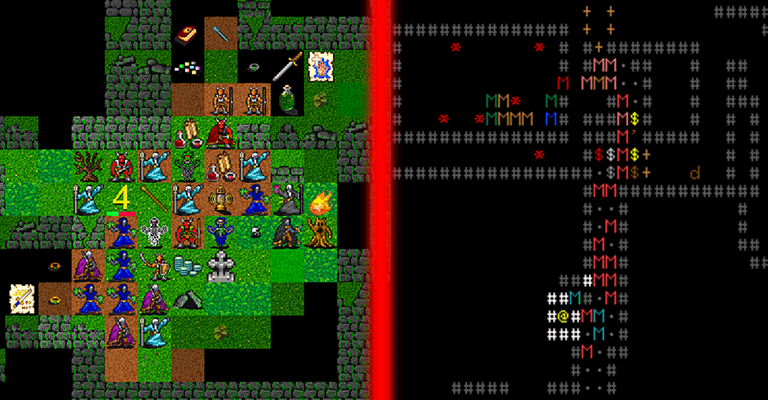 Tangaria – free open-source multiplayer roguelike game inspired by Tolkien’s lore and powered by PWMAngband; it combines the complexity and unpredictability of roguelike genre and social features of MMORPG: fight monsters together with your friends, chat, PvP (on demand), build a house, open a store to trade your goods with other players… with advanced real-time gameplay – game become semi turn-based when your character is injured.
Tangaria – free open-source multiplayer roguelike game inspired by Tolkien’s lore and powered by PWMAngband; it combines the complexity and unpredictability of roguelike genre and social features of MMORPG: fight monsters together with your friends, chat, PvP (on demand), build a house, open a store to trade your goods with other players… with advanced real-time gameplay – game become semi turn-based when your character is injured.
Tangaria got two display modes: graphical and ASCII (text):

(more screenshots in Gallery)
|
Tangaria is extremely complex game. If you played Angband before – it won’t be hard to get in (check fast start guide section), but if you are new to classic roguelike games – please prepare to delegate a half of an hour on learning basics in the introduction. I had to mention it, as plenty of people trying to get into it instantly, expecting to figure out how to play at once – which lead to fail and frustration. Don’t even try to play unless you are ready to spend some minutes in preparation to learn basic stuff. It’s good idea to start with the guide |
Roguelike features:
- permadeath. Every adventure – counts. Every new character is unique exploration experience and achievement;
- absolutely random level generation. You are constantly facing unimaginable gaming situations;
- high degree of character freedom (loads of ways to act: dig, polymorph, steal, throw any item in any direction… btw instead of drinking a potion – you can throw it to the enemy to inflict various effects based on potion’s type);
- destructible dungeon environment – tunnel walls, chop trees, make an earthquake to blast everything around you!
- perfect Hack’n’Slash experience – all boring auto-attacks your character will make automatically while giving you time to control essential stuff – casting spells, performing skills and using items;
- Non-linear walkthrough of the game, go wherever you want, every dive to the dungeon won’t be like previous one!
- anti-cheating roguelikish concept – it’s just you, your skill, your guts.. and your freedom. Grind won’t help you to survive;
- macro system which makes it’s perfectly alright to play roguelike game in ‘real-time’ – any action (including targeting enemies) could be assigned to a hotkey.
MMORPG features:
- real-time. But you could assign a certain HP threshold at which game will slow down; or just turn on/off semi turn-based mode at will;
- PvE in group. Game has great features for teamplay; the more – the merrier!
- PvP. You can duel with other characters if you will turn on PvP mode;
- Trade, barter, create your own shop. The economy is healthy because a lot of items and gold got washed out from market upon RIPs;
- Communication. Find friends, create a guild, build a house, welcome your neighbours!
- …and much more. Game has a lot of tiny beautiful features, for example, feature about artifacts – they are real artifacts. There couldn’t be two ‘Orcrist’ swords. After you found a true artifact, only you at the whole server have it (and there are mechanics which prevent players from hoarding artifacts without using them).
Extra features:
- diversity: 57 races, 38 classes, 1185 monsters, 32 dungeons, 557 items (multiplied with 122 ego types), 236 unique artifacts, 156 activation properties, 96 item’s parameters;
- graphical mode or pure ASCII – you could choose different display modes and choose one of 4 different clients which suits you;
- post-death RPG progress – your achievements saved in form of account points which gives decorative rewards (carefully balanced not to harm roguelikishness);
- one character per account. It’s forbidden to have more than one account per person to prevent cheating;
- food matters. Due world’s catastrophe, bag of wheat now cost more than two bags of gold, so most of the food should be found in the dungeons;
- disconnected stairs. Up/down staircases are ‘not connected’ between levels to prevent stair-scumming;
- additional modes. Try Ironman (adventure in Thangorodrim with zeitnot no-recall force-descend), Brave (in Carn Dum with no-recall force-descend), Diving (force-descend in regular world), Ironfoot (no-recall in regular world) and other modes!
- brackets system – innovative roguelike anti-cheating mechanics: you can enter certain dungeons only at certain level;
- no-selling to NPC to prevent boring grind when you have to go back and forth to sell junk to NPCs; in return, you get extra gold drop in the dungeon and could trade with other players!
- rebalanced telepathy & detection: no boring mechanical actions; exploration matters!
- deep storyline based on the unique fantasy universe inspired by Tolkien’s lore;
- beautiful world with handmade locations with inhabitants who will tell you their story;
- sounds and music, day/night change, Windows/Linux clients and endless amount hours which you could spend in-game to have a great time!
Screenshots (1st row – graphical mode; 2nd row – ASCII mode):






Also you could find out how the game looks like by watching videos
Beneath the simple graphics can lie worlds of complexity
seldom to be found in any other game.
Sidenotes:
Tangaria has classic roguelike gamedesign, like in Angband or Nethack: all the time your have to make REAL decisions which either would save your life or will lead you to the death. You constantly should decide ‘how to solve’ every particular situation to survive; and these situations always won’t be the same as before. Even after dozen years of playing, you will still learn new stuff every time you play. In addition, each class and most of races got its own style and to feel the bottom of the game you can play hundreds of class/race combinations as they all give different feeling of gameplay!
Tangaria is very complex game as all roguelikes. And could be arguably considered as the hardest of them all because of zeitnot (semi)-turn-based gameplay. You will die hundreds times to get the grip on the game, but almost always because of your mistakes, not because of internet connection issues or bugs as in some other MMORPGs with permadeath (for example, in Diablo 2 in most cases I died because of disconnects). Every death in Tangaria will make you better, more experienced and skilled.
Yes, Tangaria is quite hardcore. You will need clench into a fist you steel nerves and learn to consider myriads of factors to survive. In comparison to some other multiplayer roguelikes, your ability to survive isn’t based at your reaction (5% of success), but at your gaming experience (95%). Tangaria become much less fast-paced and action-orientated with introduction of slow-time mode: now you always have time to make the right decision without haste as when your character injured – game become semi-turn-based. Also you can turn on/off slow-time mode at will.
Playing with another players in a party is another great thing, but sometimes you could die because of your friend blunder (carelessly opened door, triggered trap, awakened hoards of monsters…), so you might consider to play alone while learning basics and start playing with other players in party at mid-game (30+ lvl). Also it’s important to note, that Tangaria is solo-friendly game and if you are a lone wolf – you will have great time there too. Learning curve quite balanced and you won’t get more pain there than in, say, NetHack.
Choose from any one of numerous races and classes to begin your adventures in various unexplored dungeon passageways, gaining experience by killing fierce legendary creatures, finding lost artifacts and valuable treasures, and returning to town occasionally to buy supplies and to trade with other players. You work towards near-impossible goal – an attempt to save the world by defeating the Lord of Darkness, who resides far below the surface.. and if you will manage it – to negotiate with Valars and maybe even meet Eru Iluvater afterwards… and of course throughout your journeys you will encounter many other adventurers — whether they be friend or foe is up to you to decide!
Origin:
Tangaria (2019) based at powerful PWMAngband (2007) game engine which was derived from MAngband (1998), which itself based at vanilla Angband (1992).
What the difference between Tangaria and PWMAngband?
Tangaria based at PWMAngband, so it’s got all great PWMA features. Additionally, Tangaria got its unique gamedesign and a lot of new features, like:
- 20 new classes and 40+ new races;
- each race has its own unique skill (
yto use it); - advanced dungeon’s design (it’s not only rooms and corridors) with hundreds of new terrain features;
- new storyline which continuing Tolkien universe – rebellion against Valars and multi-dimensions!
- unique carefully designed hand-made locations;
- account points which don’t disappear upon death; they allow to buy bigger houses, increase storage space, give access to more races/classes and provide other (mostly cosmetic) advantages;
- new housing system: you can build house even in town; house foundation stones could be acquired by digging; houses do not disappear after character’s death (but you inherit them without any items from previous dead character);
- unique player houses: they are randomly generated using hundreds of different walls and floors;
- new monsters types (angels, mutants, djinns, fey, unicorns, ents etc; each type includes different species) and several dozens of new monsters;
- plenty of new racial and class features; all traditional *band races rebalanced;
- crafting, salvaging and alchemy professions (for appropriate classes);
- pets for some races and classes;
- NPC system (with dialogues);
- new nourishment system – now food is one of the main resources, not just dull filler;
- customized dungeons brackets system;
- new curse system;
- rebalanced telepathy and detection magic;
- the change of day and night got additional influence on gameplay;
- enhanced movement through the landscape;
- added swimming (and flying), interaction with water and aquatic life;
- new effects and amnesia revamp;
- more interaction with terrain elements, like digging fountains (including dry ones);
- new end-game charisma stat which influence a lot of game aspects;
- eco-system (eg you could now chop down trees in daylight locations too, trees will regrow); spots from wiped houses will become wilderness in time;
- weather system;
- music and dozens of new sounds;
- strict fair-play (anti-cheating gameplay);
- ladder which shows legit character’s achievements;
- new dungeons, items, traps, stores and hundreds of new gameplay features!
Tangaria focused to take all the best features from its *band ancestors and also got inspiration from great singleplayer roguelikes like NetHack, DCSS, ToME & others, with the influence of MMORPGs (Ultima Online, World of Warcraft, Eve Online etc) and oldschool MUD’s (text MMORPGs).
Contacts:
igroglaz@⒢⒨⒜⒤⒧.⒞⒪⒨
Also, you are welcome to ask any questions @ our Discord